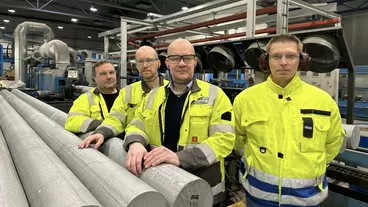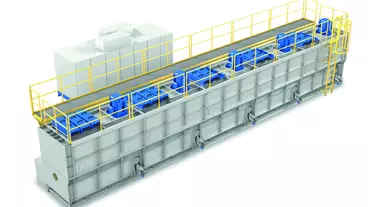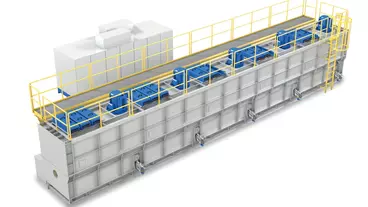Mäkelä Alu modernises production line with electric heating furnaces
Replacing a LPG furnace with a combination of an electric resistance furnace and an induction furnace improves energy efficiency and reduces CO2 emissions.

The Finnish extrusion company Mäkelä Alu in Luoma-aho, Alajärvi, operates three extrusion lines. On extrusion line 3 (P3), the billets are currently heated in a LPG furnace, which has an energy efficiency of around 40%. This furnace is to be replaced, as Tomi Pilbacka, the development manager responsible for the renovation project, explains: “We will replace the existing equipment with modern, electrically powered technology, which will reduce annual consumption of LPG by about 320 tonnes and CO2 emissions by 960 tonnes.”
Electrification will improve the energy efficiency of the process to around 70-80%. The energy demand for billet heating is almost halved, resulting in significant savings in energy procurement.
Careful planning is the key
The renovation project has been planned for two years by a team of five people, including Mäkelä Alu’s operational staff. “It is important that projects are taken forward in close cooperation with those who will use the equipment in their daily operations,“ says Pilbacka. The contract for the delivery of the components was signed in mid-November 2023.
The system will be supplied by the German company Extrutec GmbH in Moos. “We are already familiar with this company as a supplier of equipment for the P4 line. Extrutec has a long experience as a manufacturer of preheating equipment. In recent years, they have invested heavily in the development of electric billet heating systems in particular,“ says Pilbacka.
Modernisation brings many benefits
The new equipment will consist of a combination of an electric resistance furnace and an induction furnace. The project will also include replacing the billet handling table and the billet saw. “The new equipment will allow for more accurate billet temperature and a larger temperature difference in the billet, which is expected to improve the line’s hourly output. The output improvement will enable a higher production volume to be manufactured on the P3 line each year,“ Pilbacka continues.
The cost of the project is estimated at around EUR3m and includes the construction of a new transformer station. The project has been granted RFF investment aid, which accounts for 27% of the total value of the investment. RRF (Recovery and Resilience Facility) is part of the European Union’s Next Generation EU funding, which is awarded to, among other things, green transition projects. The funding is granted by the Finnish Ministry of Labor and the Economy (TEM).

Fully operational in about a year
In practice, the upgrades will be implemented at the turn of 2024/25. The P3 extrusion line will be out of service throughout December 2024. Testing of the new equipment is scheduled to start in early January 2025. The line is expected to be put into three-shift operation by mid-January 2025.
A similar project is also planned for the P2 line in 2025/26. “We will test the P3 line solution in practice for some time before taking a final decision on the equipment for the P2 line,” says Pilbacka.
The modernisation of the P3 line is part of a wider investment programme, with which Mäkelä Alu aims to reduce CO2 emissions in its own production by around 40%.
On the road to carbon-neutral production
While other aluminium companies define carbon neutrality as a long-term goal, Mäkelä Alu strives for carbon-neutral production by the end of 2025. In order to achieve this goal, the conversion of process heating systems powered by liquid gas to electric operation is a key issue. In addition to the electrification of production, the company is also investing in heat recovery. Furthermore, the construction of a large electricity storage facility is planned on the factory premises in Alajärvi.
In addition, Mäkelä Alu produces aluminium billets, AluPure, from recycled aluminium at its in-house casthouse. With 2.01 t of CO2e/t Al, AluPure has a very low carbon footprint. For purchased primary aluminium, the company refers to a footprint of 5.67 t of CO2e/t Al in its latest sustainability report. The average emissions of primary aluminium produced in Europe is 6.7 t CO2e/t Al.

Otto Junker presents a new preheater, EcoJet, which in combination with the induction furnace JuDy offers a forward-looking solution for metal processing.

Otto Junker presents a new preheater, EcoJet, which in combination with the induction furnace JuDy offers a forward-looking solution for metal processing.

After implementing comprehensive modernisation measures at its Striko Melter, Albert Weber is able to make significant energy savings with its furnace.
